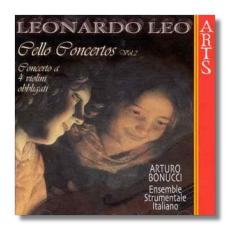
The Internet's Premier Classical Music Source
Related Links
- Leo Reviews
- Latest Reviews
- More Reviews
-
By Composer
-
Collections
DVD & Blu-ray
Books
Concert Reviews
Articles/Interviews
Software
Audio
Search Amazon
Recommended Links
Site News
 CD Review
CD Review
Leonardo Leo

Cello Concertos, Volume 2
- Concerto for Cello, 2 Violins & Continuo in A Major
- Concerto for Cello, 2 Violins & Continuo in D minor
- Concerto for 4 Violins & Continuo in D Major
Arturo Bonucci, cello
Ensemble Strumentale Italiano/Arturo Bonucci
Arts Music 47342-2 47:56
Also available Volume 1 Arts 47341-2:
Amazon
- UK
- Germany
- Canada
- France
- Japan
- ArkivMusic
- CD Universe
- JPC
Or available in 2CD Set Arts 47760-2:
Amazon
- UK
- Germany
- Canada
- France
- Japan
- ArkivMusic
- CD Universe
- JPC
Although this music has been previously reviewed on Classical Net, I mistakenly requested this disc from Albany Music Distributors, and feel compelled to review it. The entire canon was reviewed as Arts 47760-2, and I have to recommend that issue (two discs) especially if the Baroque concerto is one of your interests. Leonardo Leo had a short life, but he knew what he was doing and crafted tuneful concertos for an instrument that could sorely use more of them.
As a noted organist and teacher, concertos played a large role in an impressive compositional output. I'm surprised that someone like Yo-Yo Ma hasn't tackled these in one of his popular Baroque projects; I'd love to hear what he could do here. While seemingly simple, the cello part is technically quite challenging, and the orchestral writing is hardly submissive. Frankly, if Vivaldi can remain evergreen, there is certainly room for someone else's highly intelligent musicianship. There is competition on the market for this release, but it is scarce and probably hard to find at this date. The Concerto for Four Violins holds both drama and daring, and makes a nice filler.
Arturo Bonucci possesses both the technical and expressive abilities that the music requires. Slow movements are played with obvious care, while more virtuosic passages are easily dispatched without any loss of charm. As conductor, he leads his ensemble with equal proficiency. The strings of the Ensemble Strumentale Italiano are somewhat less than alluring, though interplay between soloists is very pleasing to the ear. When the group plays all together, the lack of polish is evident. Still, as someone who generally doesn't specialize in this kind of music, I can count this as a pleasant surprise. As this disc is only 48 minutes, the two-disc set obviously may provide greater value overall. [As of the date of this review, the two discs are less expensive if acquired separately. –Ed.] If you wish to dip into the art of Leonardo Leo, though, you could do far worse than starting here.
Copyright © 2015, Brian Wigman





















